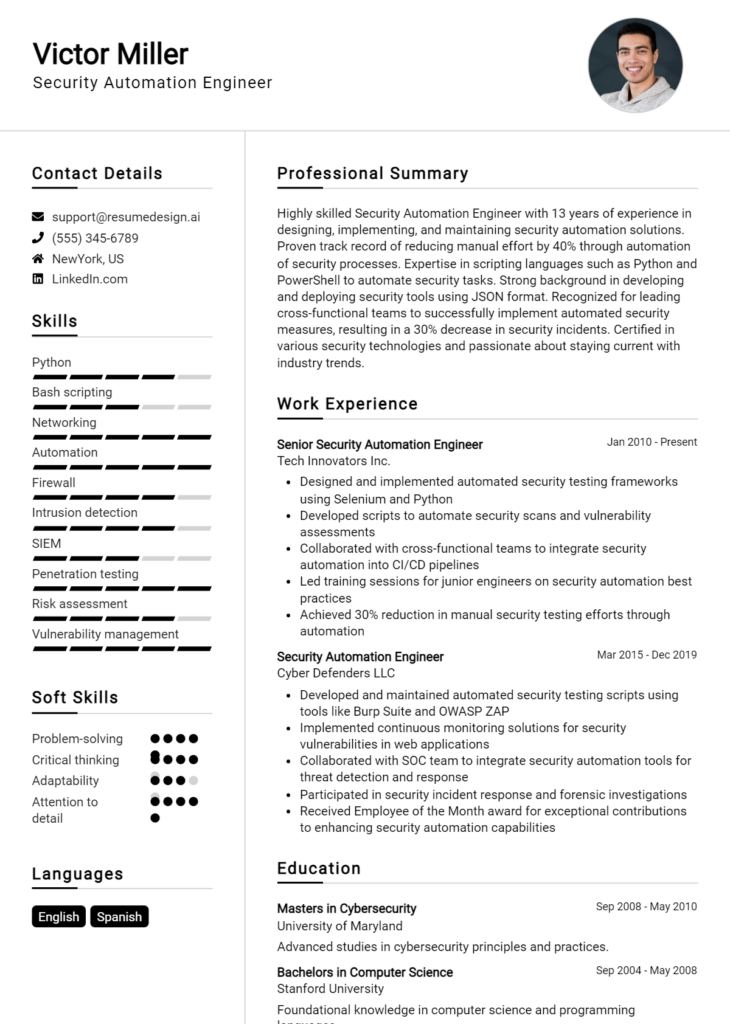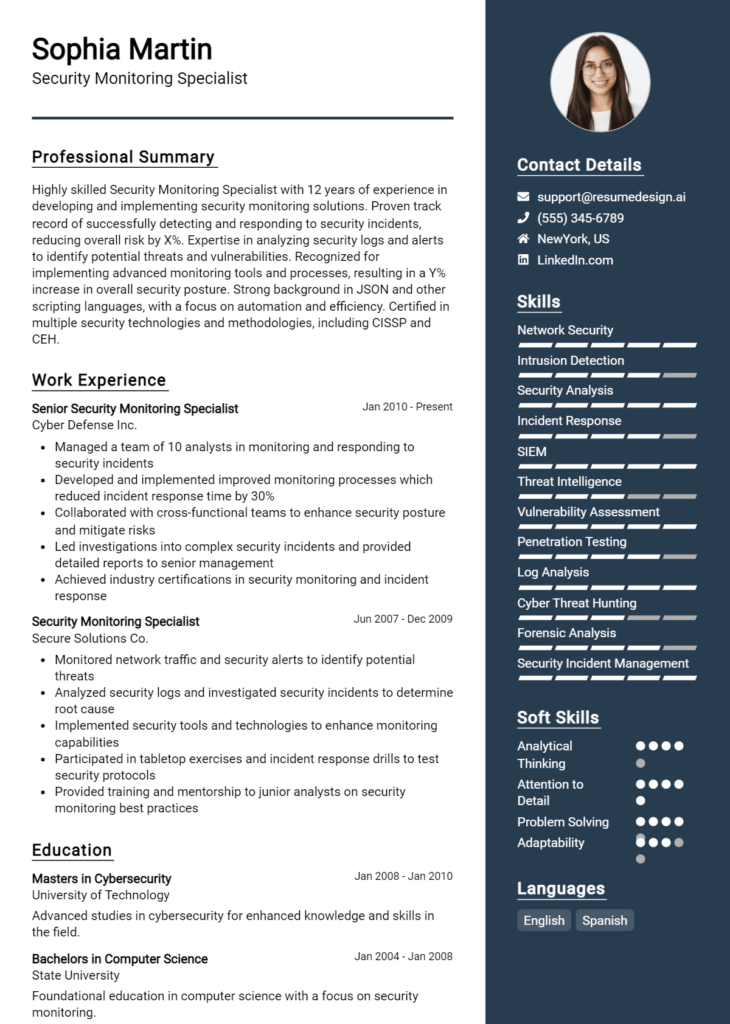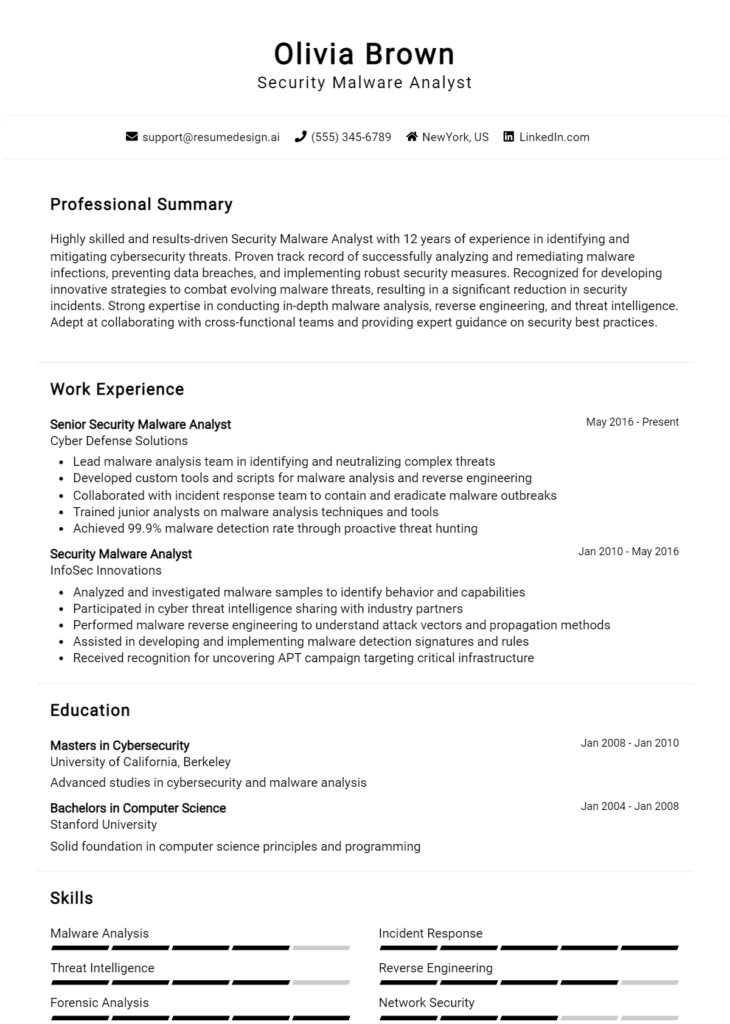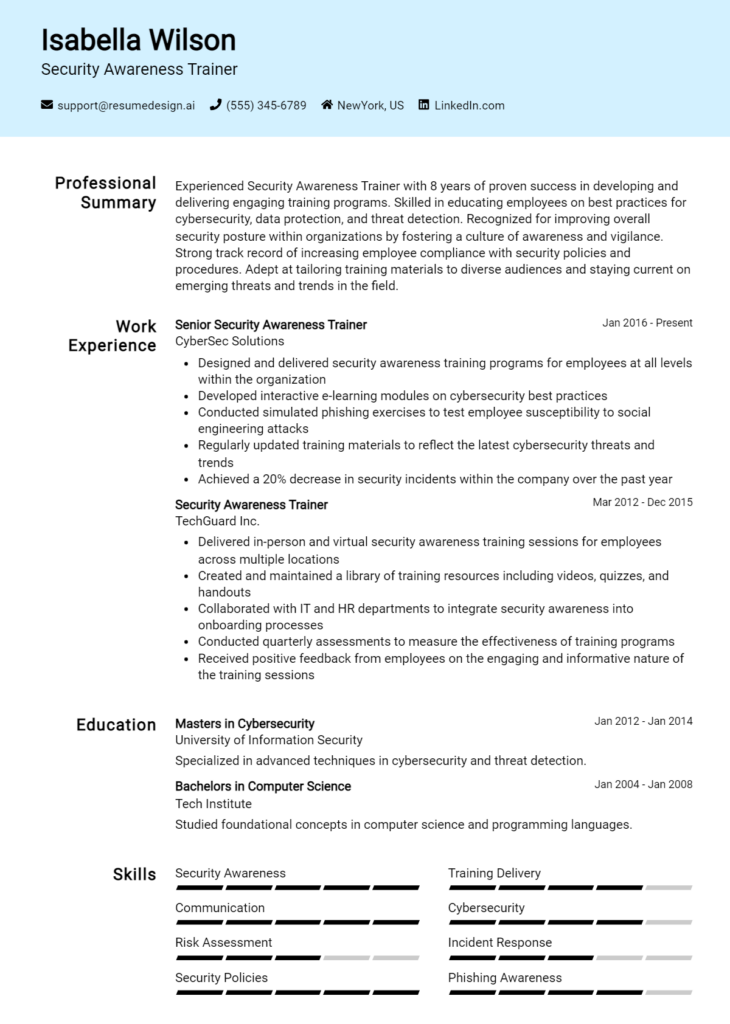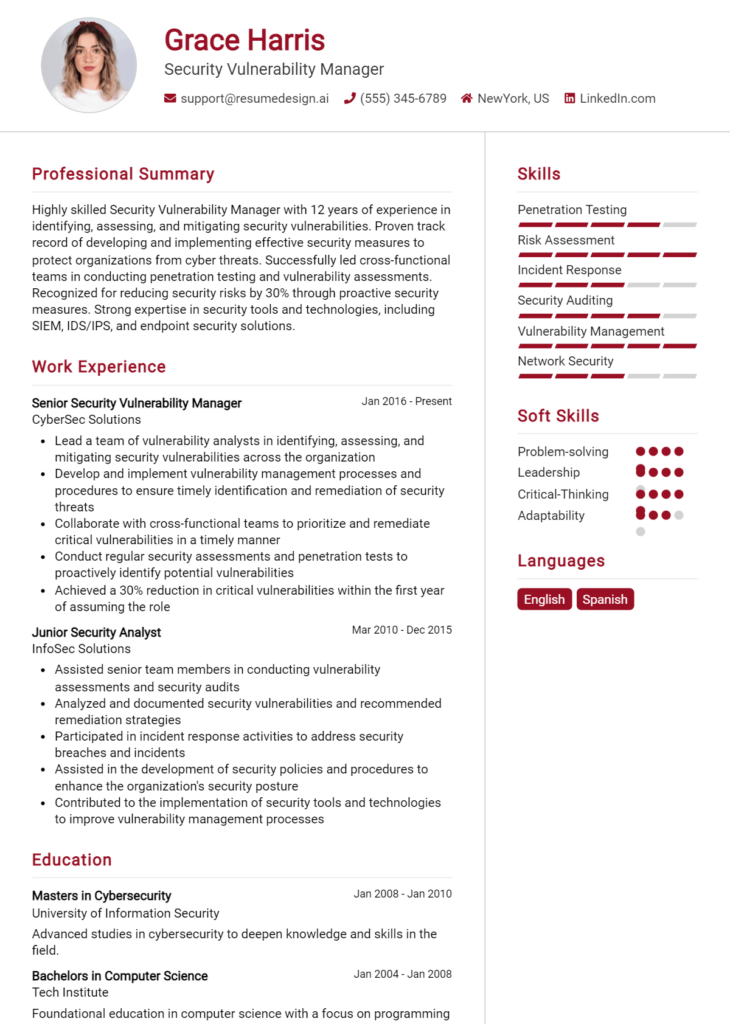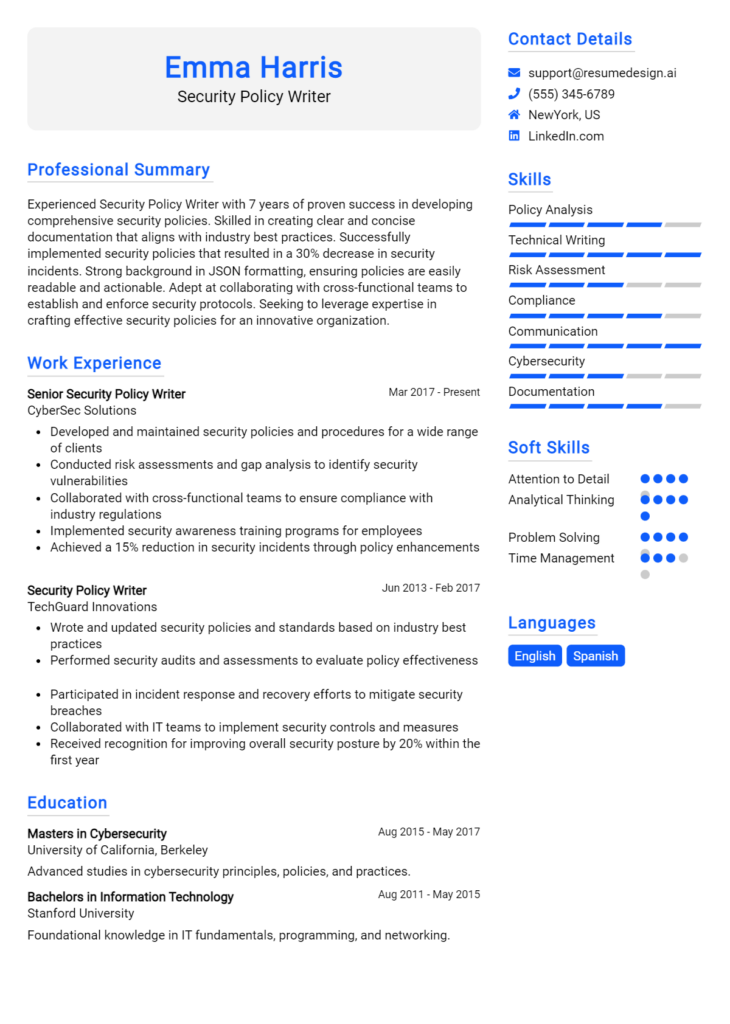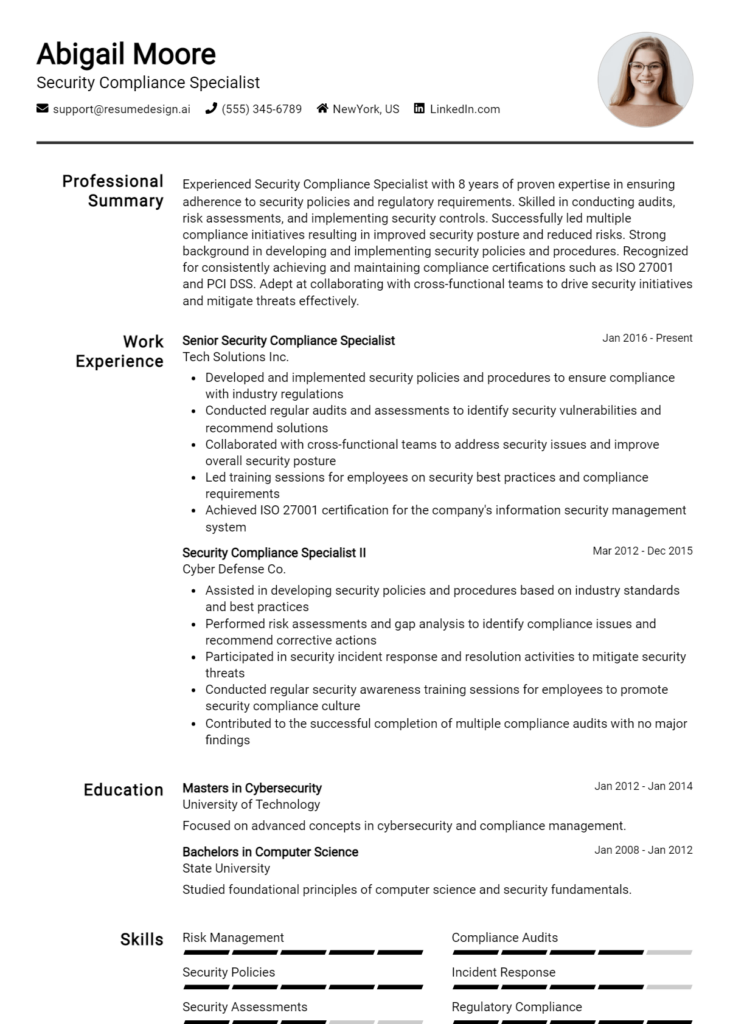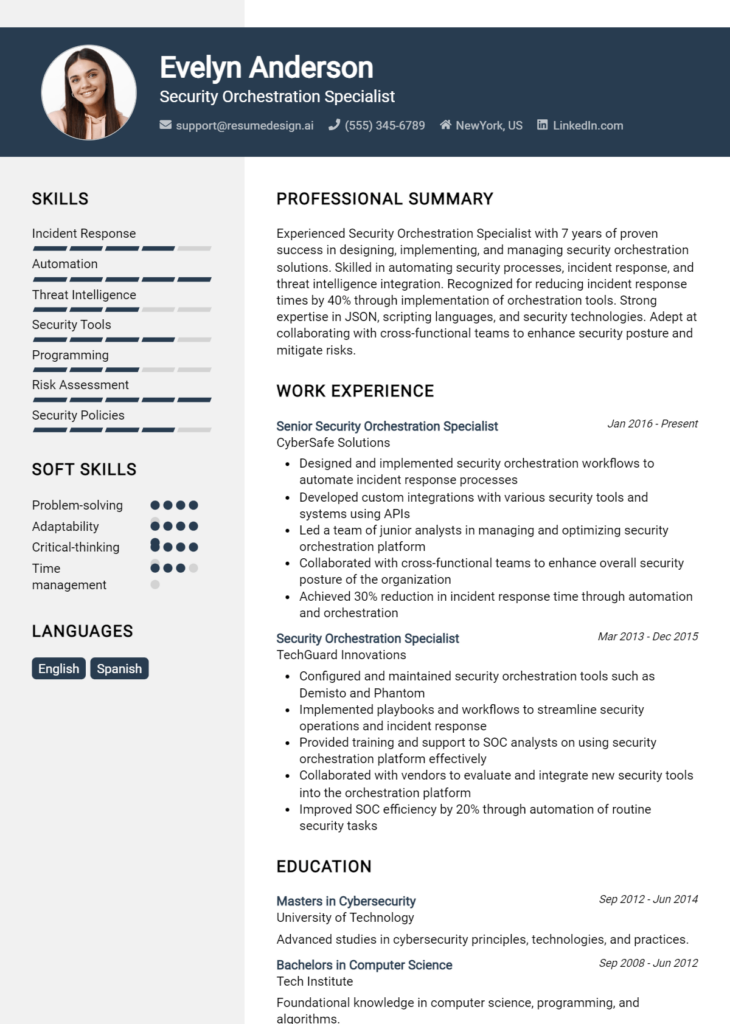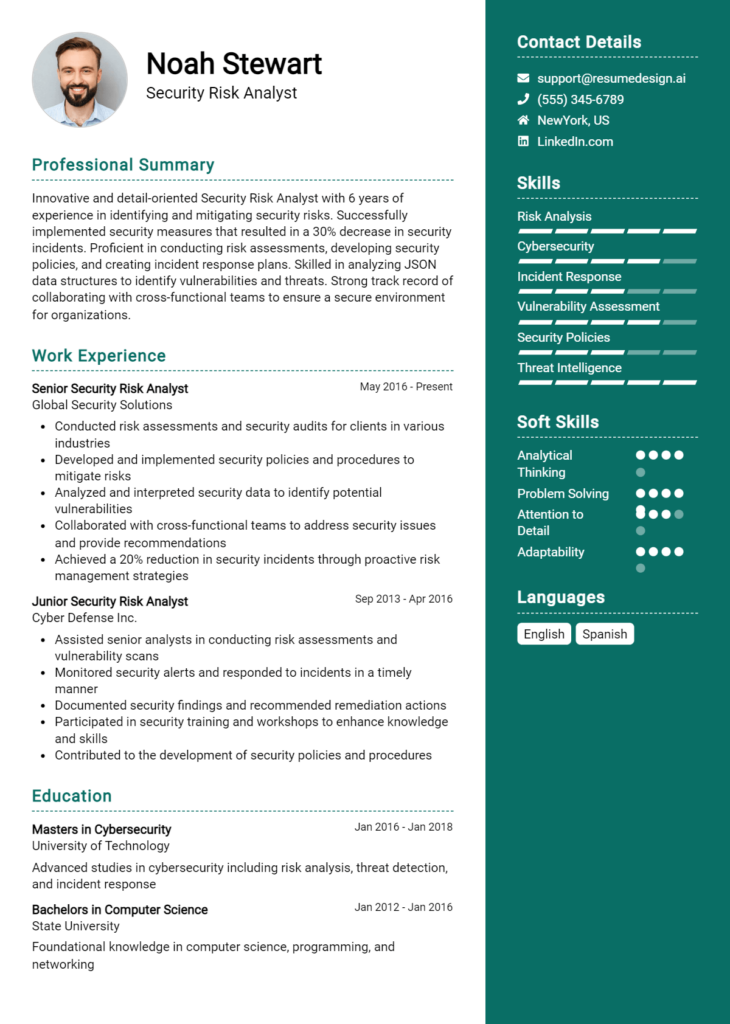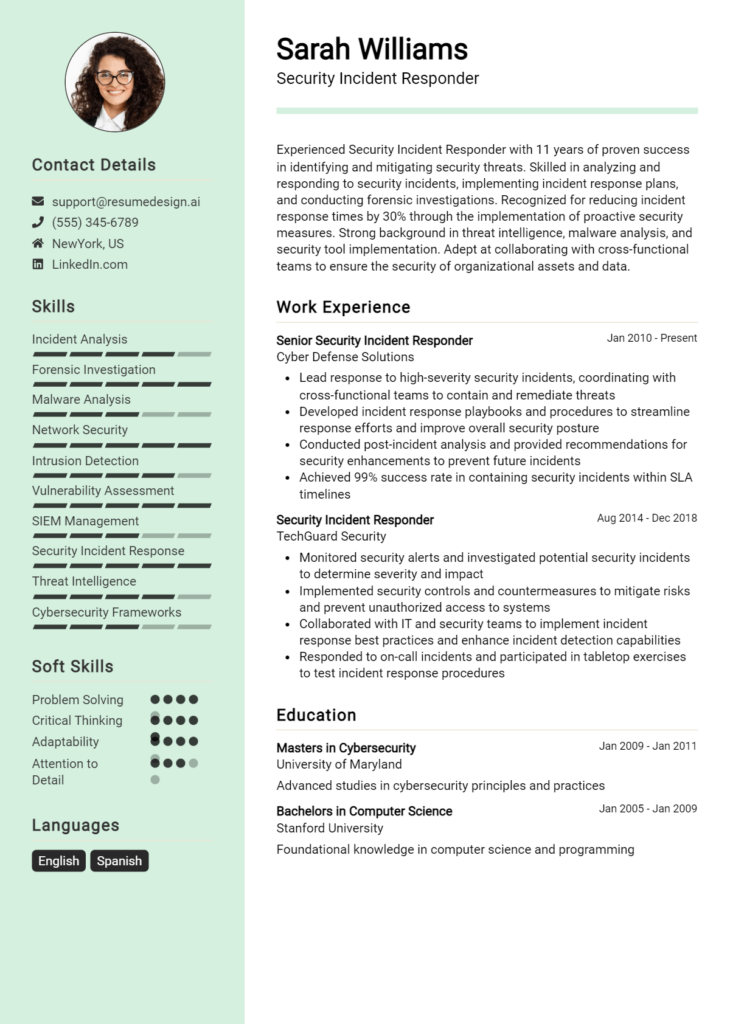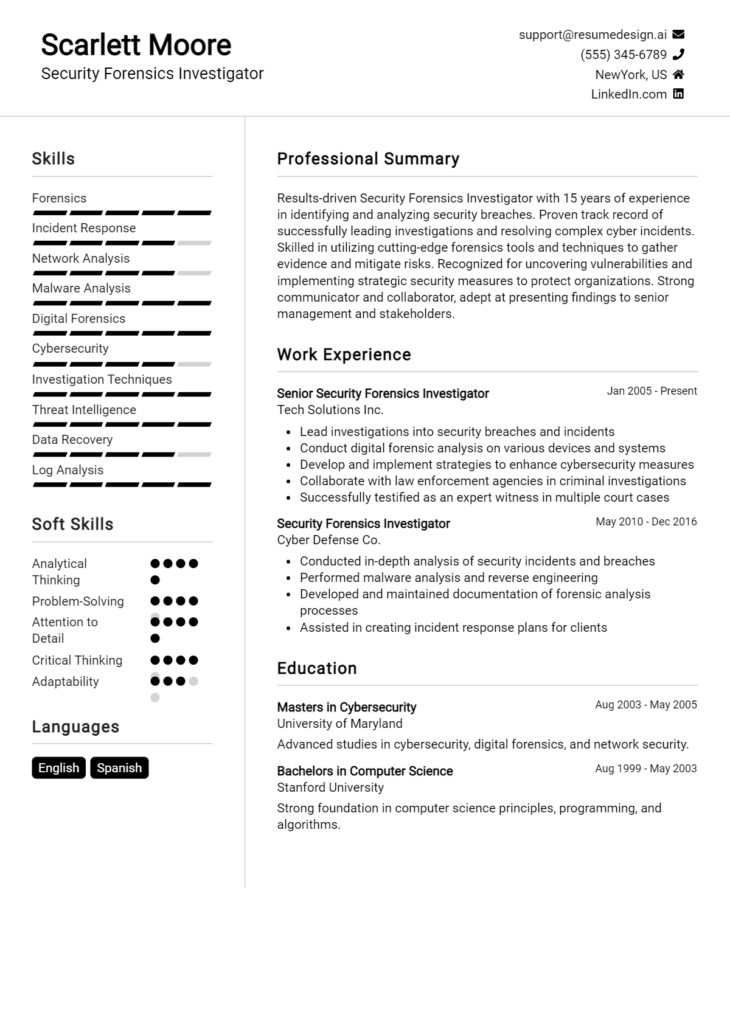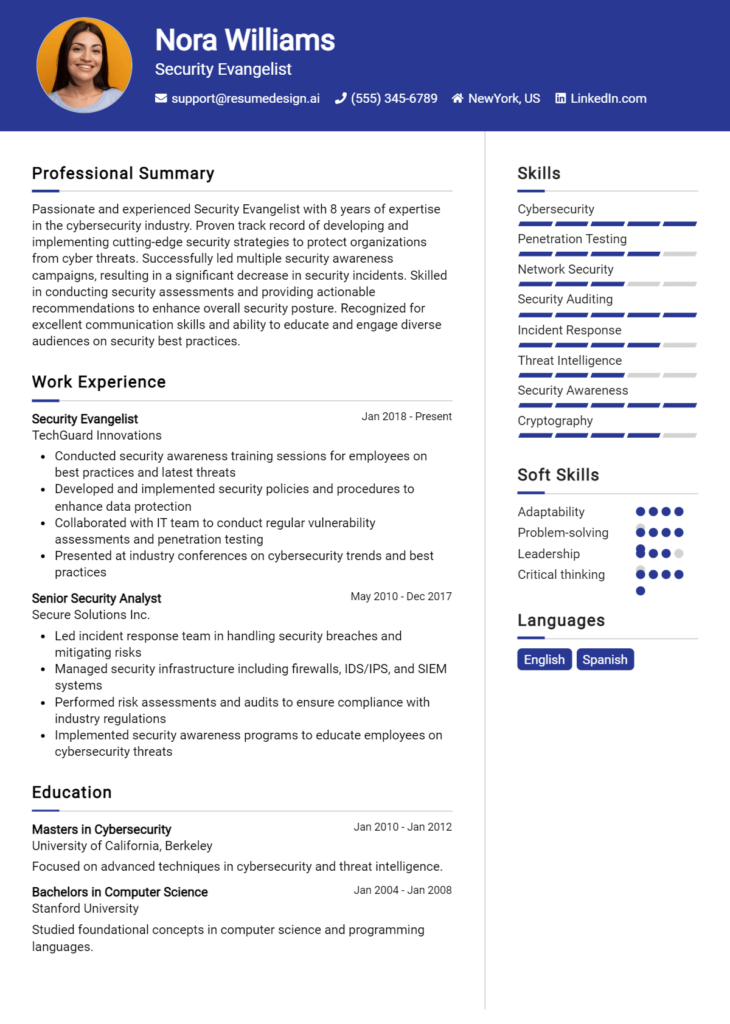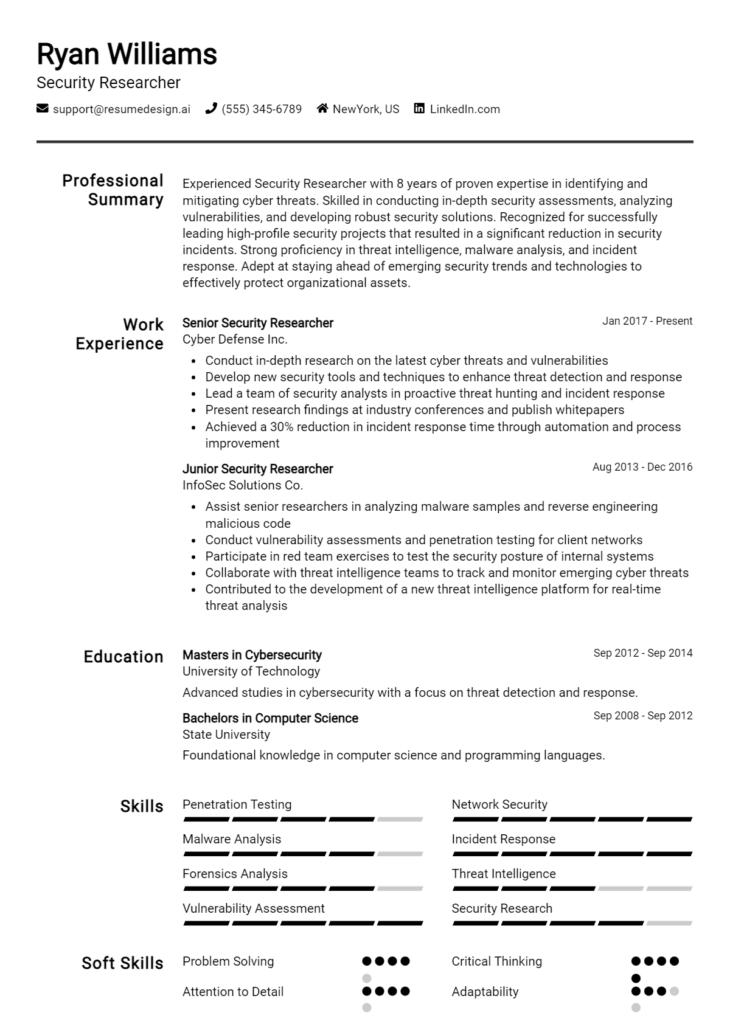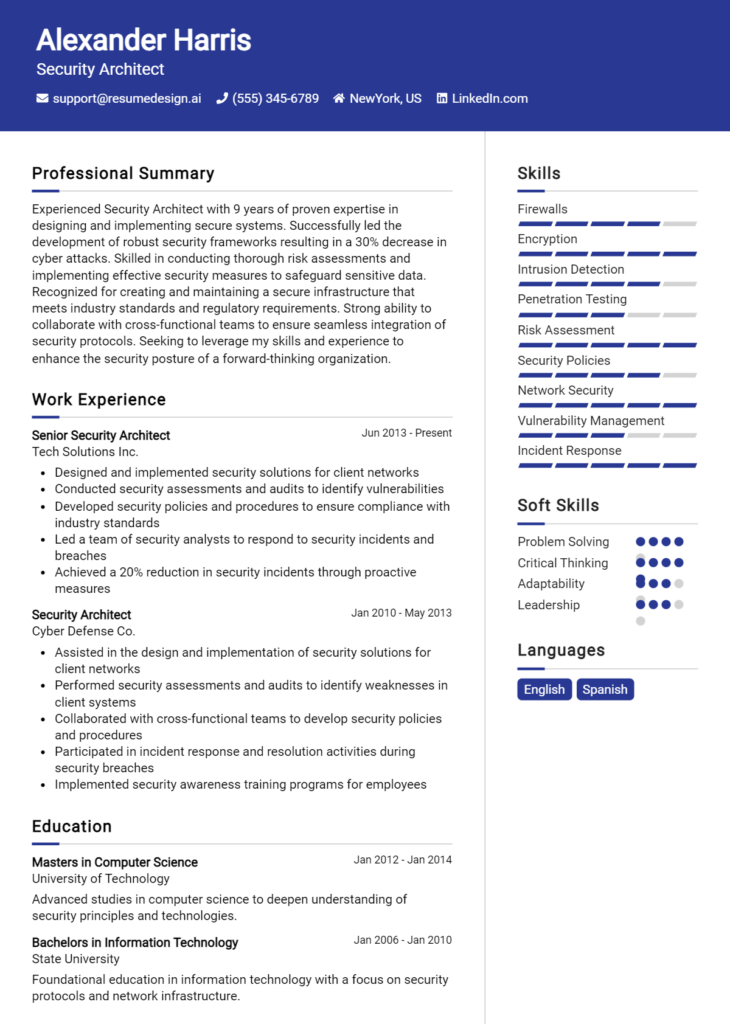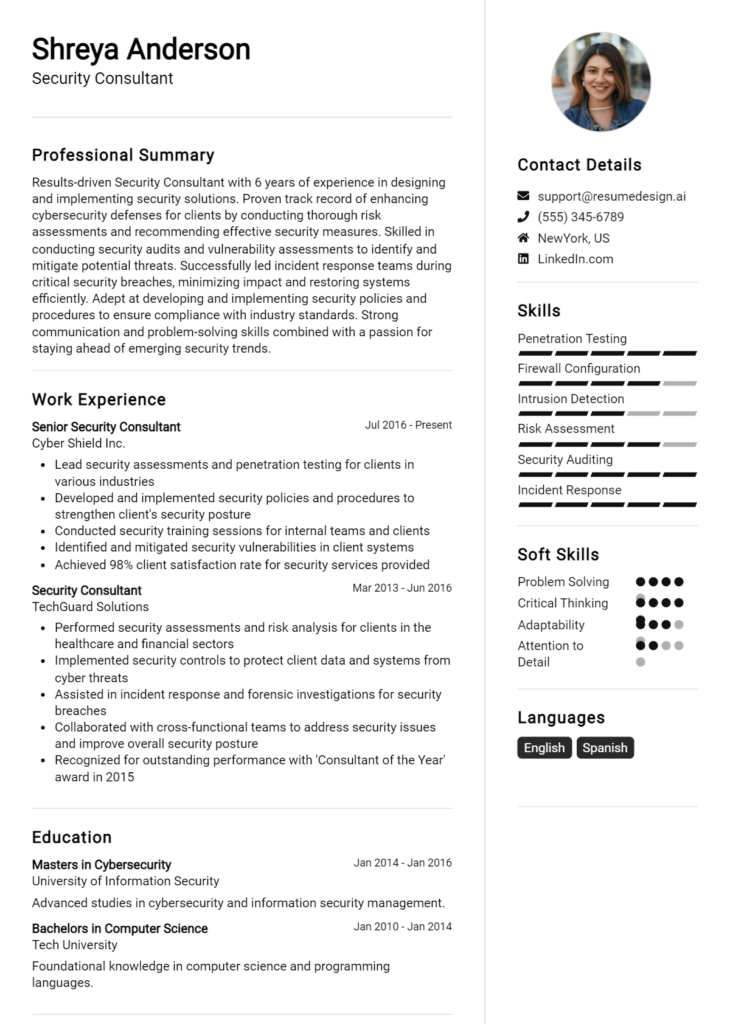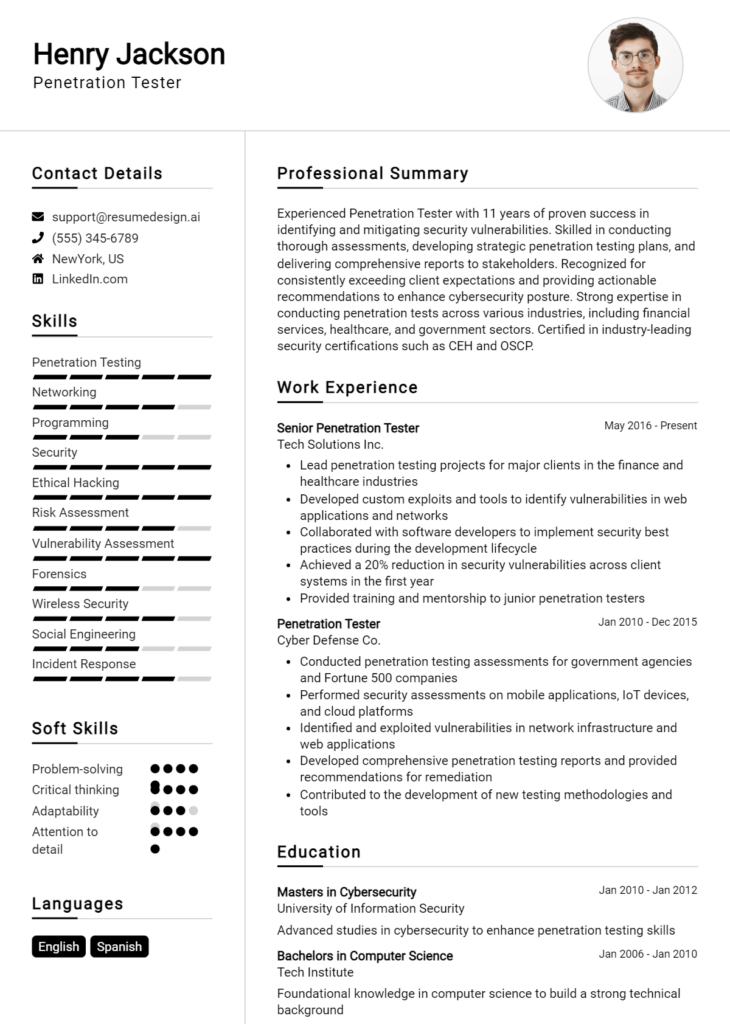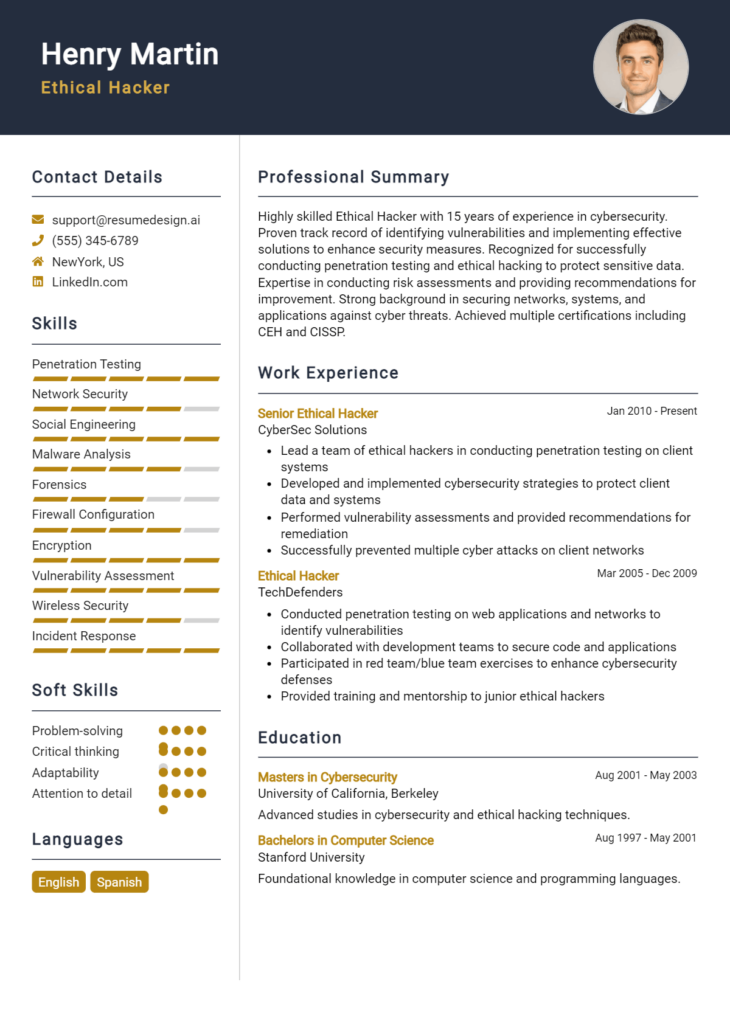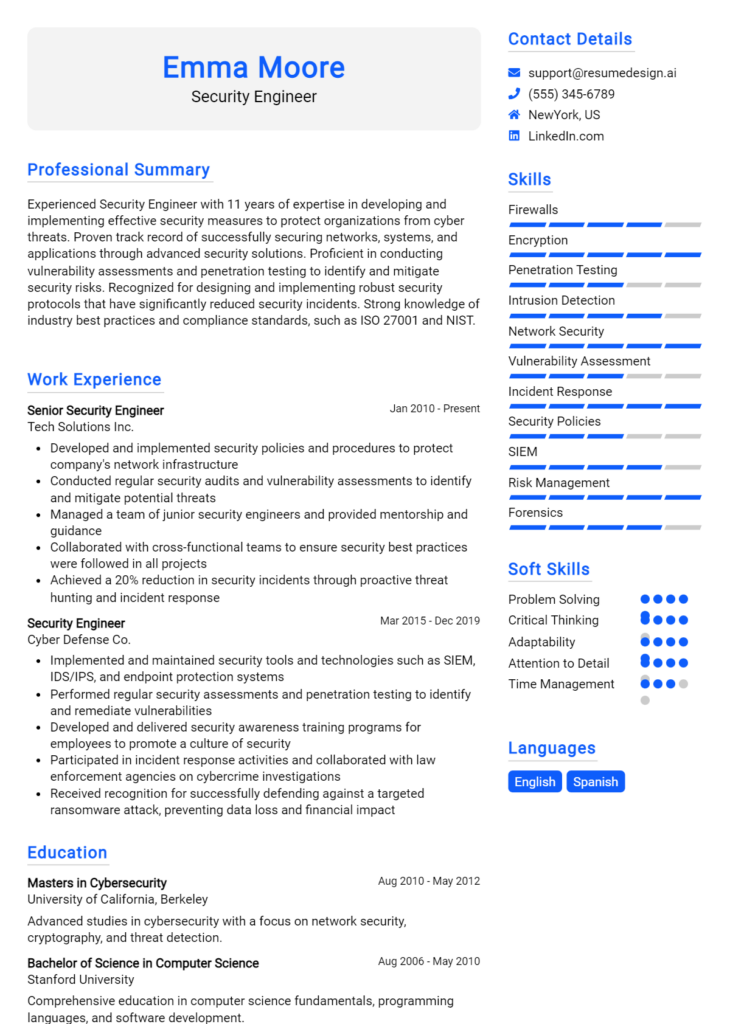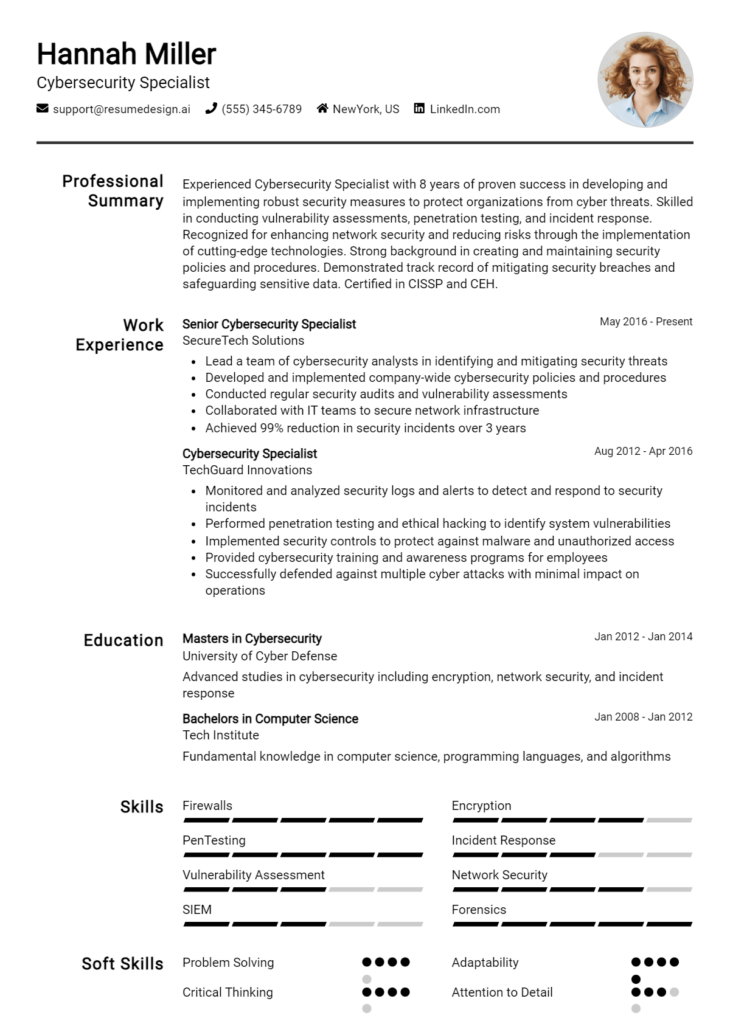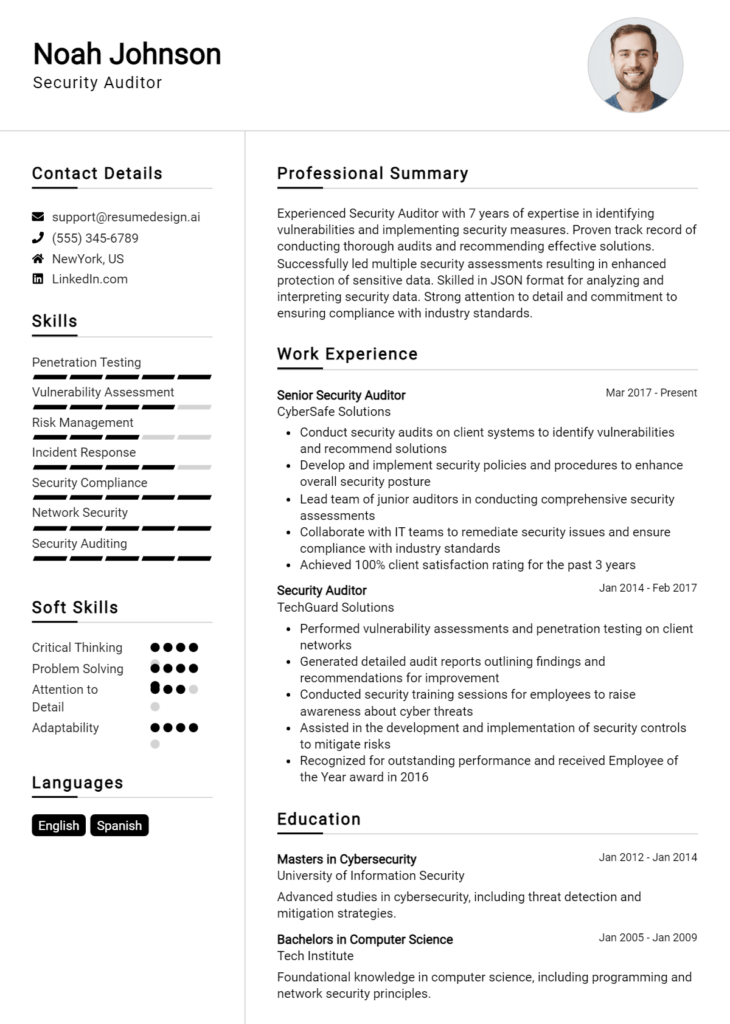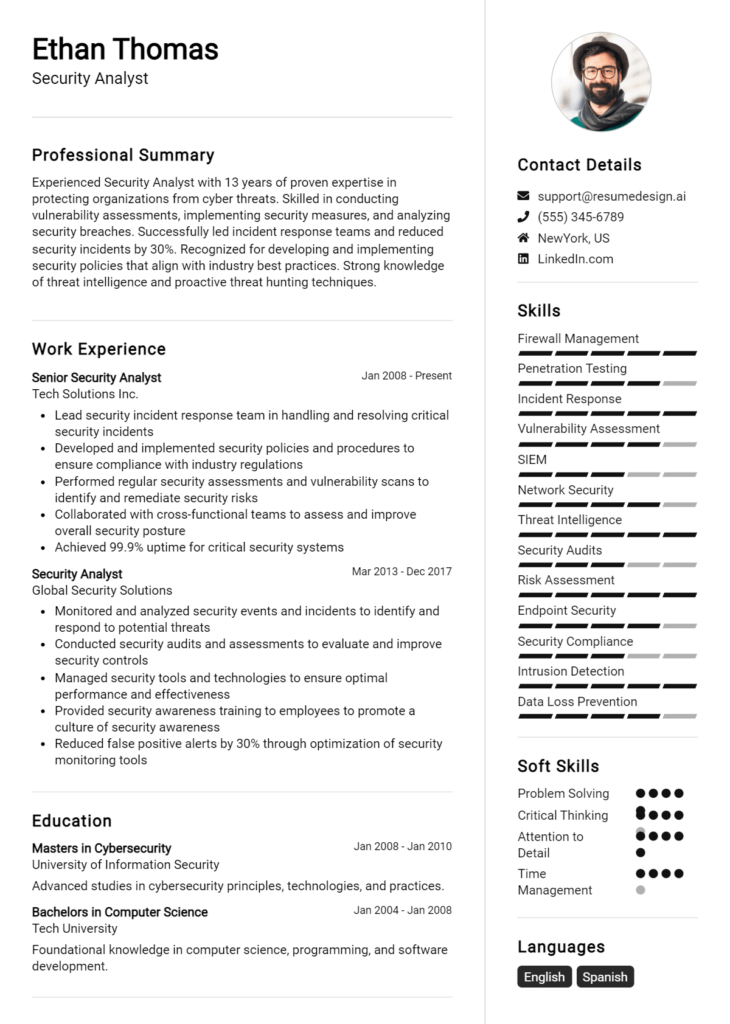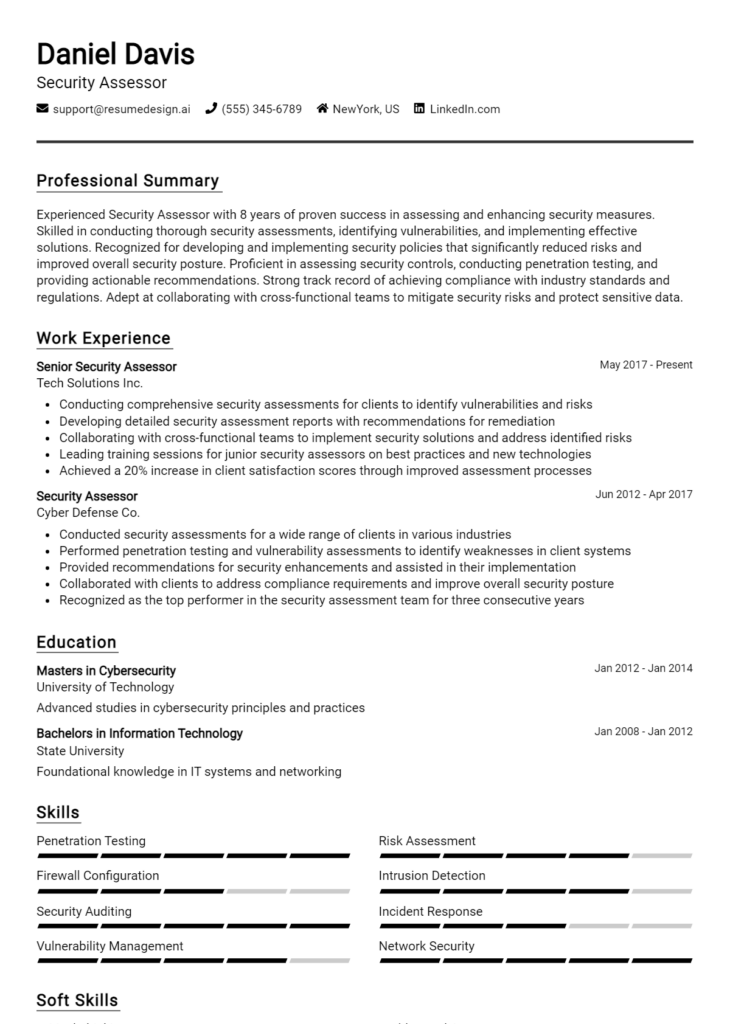Information Security Analyst Core Responsibilities
An Information Security Analyst plays a crucial role in safeguarding an organization’s digital assets by implementing security measures, monitoring systems for vulnerabilities, and ensuring compliance with regulations. This position requires a blend of technical skills, operational understanding, and strong problem-solving abilities to effectively collaborate across departments, such as IT, legal, and compliance. A well-structured resume that highlights these skills can significantly enhance a candidate's chances of success in contributing to the organization’s overarching security goals.
Common Responsibilities Listed on Information Security Analyst Resume
- Conduct risk assessments and vulnerability analysis.
- Monitor security incidents and respond to breaches.
- Implement security policies and procedures.
- Collaborate with IT teams to enhance security measures.
- Perform regular security audits and assessments.
- Stay updated on the latest security trends and threats.
- Provide training and support to employees on security practices.
- Develop and maintain incident response plans.
- Analyze security alerts and logs for suspicious activity.
- Assist in compliance audits and reporting.
- Coordinate with third-party vendors for security assessments.
- Document security incidents and remediation efforts.
High-Level Resume Tips for Information Security Analyst Professionals
In today's competitive job market, a well-crafted resume is essential for Information Security Analyst professionals looking to make a lasting impression on potential employers. As the first point of contact between candidates and hiring managers, your resume serves as a powerful tool to showcase your skills, achievements, and suitability for the role. Given the specialized nature of the field, it's crucial that your resume not only highlights your technical expertise but also demonstrates your ability to protect sensitive information and mitigate risks. This guide will provide practical and actionable resume tips specifically tailored for Information Security Analyst professionals, helping you stand out in a crowded applicant pool.
Top Resume Tips for Information Security Analyst Professionals
- Tailor your resume for each job application by closely aligning your skills and experiences with the job description.
- Highlight relevant certifications such as CISSP, CISM, or CEH to demonstrate your commitment to professional development.
- Showcase your technical proficiency with industry-specific tools and technologies, including firewalls, intrusion detection systems, and SIEM software.
- Quantify your achievements with metrics, such as percentage reductions in security incidents or successful project completions within deadlines.
- Include a dedicated 'Skills' section that lists both hard and soft skills relevant to information security, such as risk assessment and incident response.
- Utilize action verbs to describe your responsibilities and achievements, making your contributions clear and impactful.
- Incorporate keywords from the job posting to pass through Applicant Tracking Systems (ATS) and improve your visibility to recruiters.
- Emphasize any experience with compliance regulations (e.g., GDPR, HIPAA) to showcase your understanding of legal and ethical standards in information security.
- Keep the format clean and professional, using clear headings and bullet points for easy readability.
- Include a summary statement at the top of your resume that encapsulates your career goals and what you bring to the table as an Information Security Analyst.
By implementing these tips, you can significantly increase your chances of landing a job in the Information Security Analyst field. A targeted and well-structured resume will not only highlight your qualifications but also convey your dedication to the profession, making you a more attractive candidate to potential employers.
Why Resume Headlines & Titles are Important for Information Security Analyst
In the competitive field of information security, a well-crafted resume headline or title serves as the first impression for hiring managers. This brief yet powerful statement can effectively summarize a candidate's key qualifications and expertise in a single impactful phrase. A strong headline can immediately grab attention, setting the tone for the rest of the resume. It should be concise, relevant, and directly related to the job being applied for, ensuring that it resonates with the specific requirements of the information security analyst role.
Best Practices for Crafting Resume Headlines for Information Security Analyst
- Keep it concise—aim for one impactful sentence that encapsulates your strengths.
- Make it role-specific—incorporate keywords that are relevant to the information security field.
- Highlight your unique value proposition—showcase what sets you apart from other candidates.
- Use action-oriented language—choose dynamic verbs that convey your skills and accomplishments.
- Include relevant certifications or skills—mention key qualifications that align with the job description.
- Tailor your headline for each application—customize it to reflect the specific position you are applying for.
- Avoid jargon—keep the language clear and accessible to ensure it appeals to a wide audience.
- Focus on outcomes—if possible, include measurable achievements that demonstrate your impact.
Example Resume Headlines for Information Security Analyst
Strong Resume Headlines
Certified Information Security Analyst with 5+ Years of Experience in Risk Management and Incident Response
Expert in Network Security and Vulnerability Assessments with Proven Track Record of Reducing Threats
Results-Driven Information Security Professional Specializing in Compliance and Data Protection Strategies
Weak Resume Headlines
Information Security Analyst
Experienced IT Professional
The strong headlines are effective because they provide specific insights into the candidate's skills, experience, and value, making it easy for hiring managers to see how they align with the job requirements. In contrast, the weak headlines lack specificity and fail to convey the candidate’s unique strengths or qualifications, which can leave hiring managers unimpressed and searching for more compelling options.
Writing an Exceptional Information Security Analyst Resume Summary
An exceptional resume summary is crucial for an Information Security Analyst as it serves as the first impression a hiring manager will have of the candidate. A well-crafted summary quickly captures attention by succinctly showcasing key skills, relevant experience, and notable accomplishments that align with the job role. It acts as a compelling introduction that sets the tone for the rest of the resume. To be effective, the summary must be concise, impactful, and tailored specifically to the job description, ensuring that the candidate stands out in a competitive job market.
Best Practices for Writing a Information Security Analyst Resume Summary
- Quantify Achievements: Use numbers and statistics to demonstrate the impact of your work.
- Focus on Relevant Skills: Highlight skills that are directly applicable to the job description.
- Tailor for Each Application: Customize your summary for the specific position you are applying to.
- Keep it Concise: Aim for 2-4 sentences that encapsulate your qualifications effectively.
- Use Keywords: Incorporate industry-specific keywords from the job listing to enhance visibility.
- Showcase Certifications: Mention relevant certifications that enhance your credibility in the field.
- Highlight Soft Skills: Include interpersonal skills that are crucial for collaboration in security roles.
- Emphasize Continuous Learning: Note any ongoing education or training that reflects your commitment to the field.
Example Information Security Analyst Resume Summaries
Strong Resume Summaries
Results-driven Information Security Analyst with over 5 years of experience protecting sensitive data and infrastructure. Successfully led a cybersecurity initiative that reduced security incidents by 40%, while achieving compliance with ISO 27001 standards.
Detail-oriented professional with expertise in threat analysis and risk management. Implemented a security framework that improved incident response time by 30%, and trained over 100 employees on security best practices.
Certified Information Systems Security Professional (CISSP) with a proven track record of fortifying networks against cyber threats. Spearheaded a project that resulted in a 50% decrease in data breaches within one year.
Weak Resume Summaries
Information Security Analyst with experience in IT security. Looking for a challenging position to apply my skills.
Skilled in various aspects of cybersecurity and data protection. Seeking opportunities in a dynamic environment.
The examples above illustrate the difference between strong and weak resume summaries. Strong summaries are specific, quantifiable, and directly relevant to the Information Security Analyst role, effectively showcasing the candidate's achievements and skills. Conversely, weak summaries are vague and generic, failing to provide tangible evidence of the candidate's capabilities or relevance to the position, ultimately making them less compelling to hiring managers.
Work Experience Section for Information Security Analyst Resume
The work experience section of an Information Security Analyst resume is a critical component that illustrates a candidate's technical skills and professional accomplishments. This section not only highlights the individual’s ability to manage teams and collaborate across departments but also demonstrates their commitment to delivering high-quality security products and solutions. By quantifying achievements and aligning experiences with industry standards, candidates can effectively showcase their value to potential employers, making it easier for them to recognize the applicant's expertise and fit for the role.
Best Practices for Information Security Analyst Work Experience
- Highlight specific technical skills relevant to the role, such as knowledge of firewalls, intrusion detection systems, and security protocols.
- Quantify achievements with metrics, such as percentage reductions in security breaches or time saved in incident response.
- Emphasize leadership roles and team collaborations to showcase your ability to manage projects and influence cross-functional teams.
- Regularly align your experiences with industry standards and frameworks, such as NIST or ISO 27001.
- Use action-oriented language to convey a sense of proactivity and impact in your roles.
- Tailor your work experience to the job description by incorporating relevant keywords and phrases.
- Include any certifications or training that bolster your technical credibility.
- Provide context for your achievements, explaining the challenges faced and the solutions implemented.
Example Work Experiences for Information Security Analyst
Strong Experiences
- Led a team of 5 analysts in a project that reduced network vulnerabilities by 30% through the implementation of a new security protocol.
- Developed an incident response plan that decreased average incident resolution time by 40%, resulting in enhanced system uptime.
- Collaborated with cross-functional teams to conduct a comprehensive risk assessment, identifying and mitigating 15 critical security threats within 6 months.
- Managed a project that transitioned the organization to a cloud-based security solution, improving scalability and reducing costs by 25%.
Weak Experiences
- Worked on security tasks and assisted with various projects.
- Responsible for monitoring systems and resolving issues as they arose.
- Participated in team meetings to discuss security protocols.
- Helped with the implementation of security measures.
The examples of strong experiences are considered effective because they provide specific, quantifiable outcomes that clearly demonstrate the candidate's technical expertise and leadership skills. They illustrate a proactive approach to problem-solving and showcase measurable achievements. In contrast, the weak experiences lack detail and specificity, failing to convey the candidate's contributions or the impact of their work. They do not highlight any significant accomplishments or skills, making it difficult for potential employers to assess the candidate's qualifications.
Education and Certifications Section for Information Security Analyst Resume
The education and certifications section of an Information Security Analyst resume is crucial as it serves to highlight the candidate's academic background and industry-relevant qualifications. This section not only showcases formal education but also emphasizes the importance of continuous learning in a rapidly evolving field like information security. By providing relevant coursework, certifications, and specialized training, candidates can significantly enhance their credibility and demonstrate their alignment with the specific requirements of the job role. Strong educational foundations and recognized certifications signal to employers that the candidate possesses both the theoretical knowledge and practical skills necessary to excel in the field.
Best Practices for Information Security Analyst Education and Certifications
- Focus on relevant degrees, such as Computer Science, Information Technology, or Cybersecurity.
- Include industry-recognized certifications like CISSP, CISM, or CompTIA Security+.
- Highlight specialized training in areas such as ethical hacking or risk management.
- List relevant coursework that aligns with the job responsibilities, such as network security or cryptography.
- Be specific about certification dates and renewal status to show ongoing commitment to professional development.
- Use clear formatting to differentiate between degrees and certifications for easier readability.
- Consider including honors or distinctions received during your educational journey.
- Keep the section concise while ensuring all listed credentials are pertinent to the role.
Example Education and Certifications for Information Security Analyst
Strong Examples
- Bachelor of Science in Cybersecurity, University of Technology, 2020
- Certified Information Systems Security Professional (CISSP), 2022
- CompTIA Security+, 2021
- Relevant Coursework: Network Security, Cryptography, Incident Response
Weak Examples
- Associate Degree in General Studies, Community College, 2018
- Certification in Microsoft Office Suite, 2019
- High School Diploma, 2016
- Outdated certification: Certified Ethical Hacker (CEH), expired 2021
The examples provided illustrate the distinction between strong and weak qualifications in the context of an Information Security Analyst role. Strong examples reflect relevant degrees and certifications that are recognized in the industry, showcasing the candidate's preparedness for the challenges of the role. In contrast, weak examples highlight irrelevant or outdated qualifications that do not align with the expectations of employers in the information security field, potentially undermining a candidate's application.
Top Skills & Keywords for Information Security Analyst Resume
As an Information Security Analyst, possessing the right set of skills is crucial for effectively safeguarding an organization’s data and infrastructure. A well-crafted resume that highlights both hard and soft skills can significantly enhance your chances of landing the desired position. Hard skills demonstrate your technical capabilities, while soft skills reflect your interpersonal abilities and problem-solving mindset. Together, they create a comprehensive profile that potential employers seek, showcasing your readiness to tackle the challenges posed by evolving cyber threats. Therefore, it is essential to tailor your resume to emphasize these competencies, ensuring you stand out in a competitive job market.
Top Hard & Soft Skills for Information Security Analyst
Soft Skills
- Analytical Thinking
- Problem-Solving
- Communication Skills
- Attention to Detail
- Team Collaboration
- Adaptability
- Critical Thinking
- Time Management
- Project Management
- Decision-Making
- Leadership
- Conflict Resolution
- Customer Service Orientation
- Creativity
- Empathy
- Negotiation Skills
- Ethical Judgment
Hard Skills
- Risk Assessment
- Intrusion Detection Systems (IDS)
- Firewall Management
- Network Security Protocols
- Vulnerability Assessment
- Incident Response Planning
- Security Information and Event Management (SIEM)
- Penetration Testing
- Data Encryption Techniques
- Compliance Standards (e.g., GDPR, HIPAA)
- Malware Analysis
- System Hardening
- Cloud Security
- Forensics Analysis
- Security Auditing
- Programming/Scripting Languages (e.g., Python, SQL)
- Threat Intelligence Analysis
By focusing on these key skills and effectively detailing your work experience, you can create a compelling resume that highlights your qualifications as an Information Security Analyst.
Stand Out with a Winning Information Security Analyst Cover Letter
I am writing to express my interest in the Information Security Analyst position at [Company Name], as advertised on [where you found the job posting]. With a robust background in cybersecurity and a proven track record of safeguarding sensitive information, I am excited about the opportunity to contribute to your organization's security posture. My hands-on experience in developing and implementing security protocols, conducting risk assessments, and responding to incidents has equipped me with the skills necessary to excel in this role.
In my previous position at [Previous Company Name], I successfully led a team that identified and mitigated critical vulnerabilities, resulting in a 30% decrease in security incidents over a year. I am adept at utilizing a variety of security tools and technologies, such as intrusion detection systems, firewalls, and encryption methods, to enhance data protection. My analytical skills allow me to assess potential threats and develop strategic responses, ensuring that sensitive information remains secure against evolving cyber threats.
I am particularly drawn to [Company Name] because of your commitment to innovation and proactive security measures. I admire your focus on integrating security into the software development lifecycle and believe my experience in collaboration with cross-functional teams will be an asset. I am eager to bring my expertise in incident response and security awareness training to your organization, helping to cultivate a culture of security among employees.
Thank you for considering my application. I am looking forward to the opportunity to discuss how my background, skills, and enthusiasms align with the goals of [Company Name]. I am eager to contribute to your team and help strengthen your information security initiatives.
Common Mistakes to Avoid in a Information Security Analyst Resume
When crafting a resume for the role of an Information Security Analyst, it's crucial to avoid common pitfalls that can diminish the impact of your application. A well-structured resume not only highlights your qualifications but also conveys your attention to detail, which is paramount in the field of information security. Below are some frequent mistakes candidates make that can hinder their chances of landing an interview:
Generic Objective Statements: Using a vague objective that doesn't reflect your specific goals or the role you’re applying for can make your resume blend in with the rest. Tailor your objective to the position to demonstrate your genuine interest.
Lack of Relevant Keywords: Failing to include industry-specific keywords can result in your resume being overlooked by Applicant Tracking Systems (ATS). Incorporate terms like "risk assessment," "incident response," and "compliance" to align with the job description.
Overloading with Technical Jargon: While it's important to showcase your technical skills, using excessive jargon without context can alienate hiring managers. Ensure your skills are clearly explained and relevant to the role.
Inconsistent Formatting: A resume with inconsistent fonts, sizes, or spacing can appear unprofessional. Stick to a clean, uniform format to enhance readability and demonstrate professionalism.
Neglecting Soft Skills: Information Security Analysts need strong analytical and problem-solving skills. Failing to include soft skills such as communication and teamwork can make your resume less compelling.
Focusing on Duties Instead of Achievements: Listing job responsibilities instead of quantifiable achievements can make your contributions seem less impactful. Use metrics and specific examples to highlight your accomplishments.
Ignoring the Importance of a Summary: Omitting a summary at the top of your resume can make it harder for employers to quickly understand your qualifications. A concise summary can effectively encapsulate your experience and skills.
Excessive Length: A resume that is too long can deter hiring managers from reading it thoroughly. Aim for one to two pages, focusing on the most relevant experience and skills that pertain to the position.
Conclusion
As we’ve explored the essential skills and responsibilities of an Information Security Analyst, it’s clear that this role is pivotal in safeguarding an organization's sensitive data against cyber threats. Key competencies include risk assessment, incident response, knowledge of security frameworks, and technical proficiency with various security tools. Additionally, a strong understanding of compliance regulations and the ability to communicate security policies effectively are critical for success in this field.
In conclusion, as the demand for skilled Information Security Analysts continues to grow, it’s vital to ensure that your resume reflects your qualifications and experience accurately. Take a moment to review your resume and make necessary updates to highlight your expertise in information security.
To help you in this process, consider utilizing available resources such as resume templates, which offer a variety of professional designs; the resume builder for user-friendly customization; resume examples for inspiration; and cover letter templates to complement your application. Don’t miss the opportunity to present your qualifications in the best light—start enhancing your resume today!

